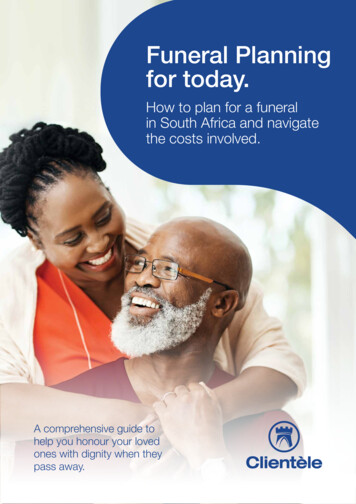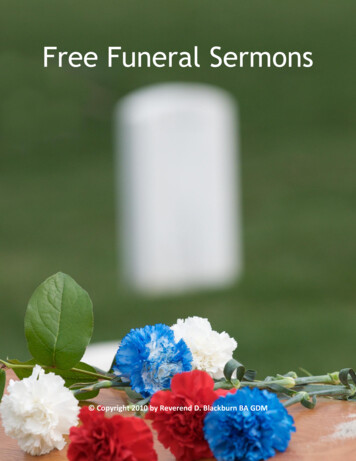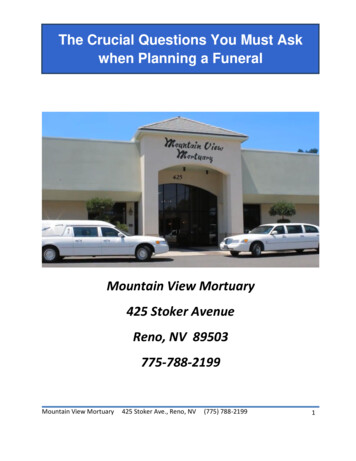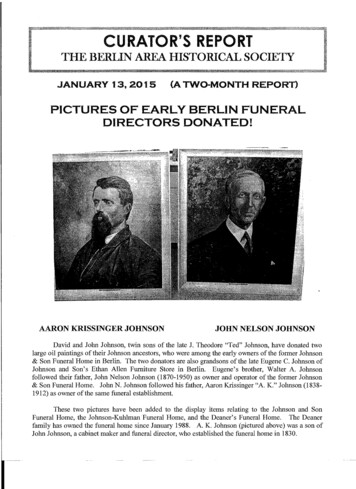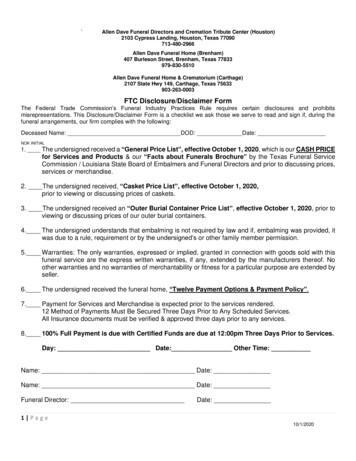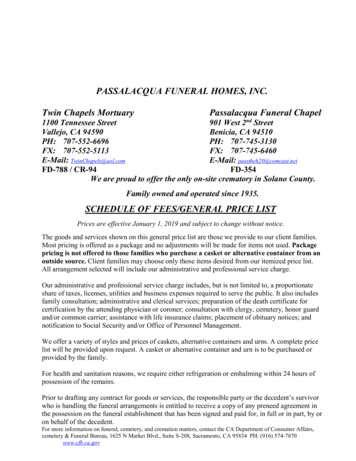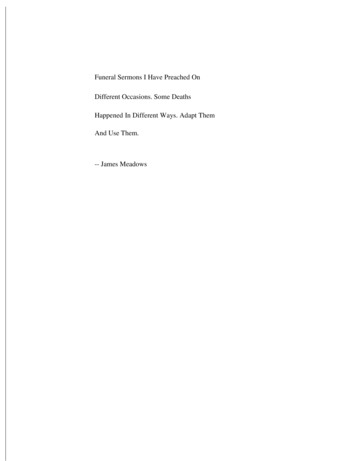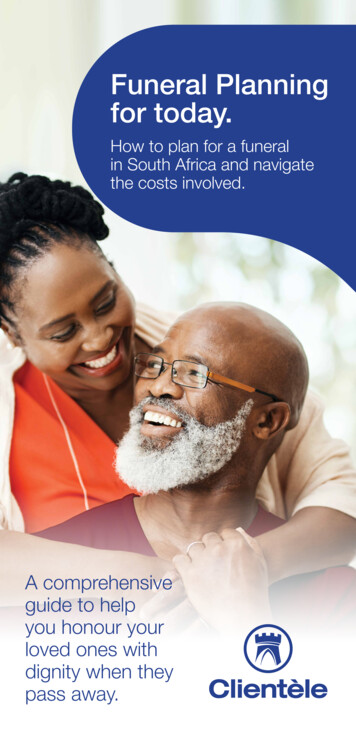
Transcription
Funeral Planningfor today.How to plan for a funeralin South Africa and navigatethe costs involved.A comprehensiveguide to helpyou honour yourloved ones withdignity when theypass away.
Contents34IntroductionSpeaking aboutdeath5Create a Life File6Important steps ifsomeone close toyou passes away9How to plan a funeral- Choosing a funeral parlour- What does an undertakerdo?- Traditional funerals- Pre-arranged funerals- Exhumations- Choosing a coffin or acasket- Cemeteries & graves- Choosing a tombstone- Transport- Food & catering- Venue and tent hire- Flowers- Clothing for the deceased- Funeral music and hymns- The eulogy- Cremations- Obituaries28What to do whensomeone close toyou passes away- Passing away at home- Passing away due to anaccident- Passing away in a hospital- Passing away in anothercountry (repatriation)33How to get the DeathCertificate35Funeral and lifecover- What are the benefitsof being covered?- What does funeralinsurance cost?- Claiming on a policy39Handling thedeceased’s estate- What is an ‘estate’?- What is an ‘executor’?- Costs typically payablewhen winding up an estate- The steps for winding upa deceased estate- What if there is no Will?44Frozen bankaccounts- Why do the banks freezethe deceased’s bankaccount?- How to access funds froma frozen bank account46Funeral PlanningGuide Checklist49Important contacts
IntroductionPlanning a funeral can be a difficultexperience with unnecessary stress.Whether you are planning your ownfuneral for the future, or you haverecently lost a loved one and need toplan a funeral for them, we have puttogether this practical guide to help youwith general funeral planning, what toexpect and what some of the costs are.This enables you to have the breathing spaceand peace of mind you need to concentrateon your family and to grieve your loss.Safeguarding your world when you need itmost.Remember that it is good to have trusted family andclose friends to help you. Communities, elders andreligious organisations, such as churches, can alsohelp.At the end of the document is a handy checklistto help you check the administrative and funeralrequirements.3
It is important to speakabout your funeral planningand wishes with your familyand those close to you.Speakingabout death1 Let them know where your importantdocuments are2Where you have policies and accounts3Where you keep your ID4What you would like at your funeral5I f you have a certified up-to-date Will andwhere it is kept6 Make sure that the beneficiaries on yourpolicies are correct, as this could createcomplications for your family later on at claimstage.4
A Life File will go a longway to helping your familyand loved ones deal withthe administration andpaperwork afteryour passing.Create a Life FileThis is a file about all the importantaspects of your life. You must keep itsafe, and only certain trusted familymembers must know about it.A Life File contains all your personalinformation, such as: Bank accounts Life and funeral policies Investments Property details Your certified Will Your nominated estate executors and lawyers A copy of your ID.It will also help deal with family feuds, as yourcertified Will can be executed by a legal executor.5
11 Important stepsif someone closeto you passesaway.1 Contact the relevant authorities.These could be emergencymedical professionals with anambulance service such asNetcare 911 or ER24, yourfamily doctor or the SAPS.234 Locate the deceased’s IDsmartcard or green barcodedID book. Locate the deceased’s IDsmartcard or green barcodedID book. Contact your religious, culturalor community leaders andelders.6
56 Choose a reliable andreputable funeral parlour thatwill help you to arrange thefuneral. Find out if the deceased hadany funeral or life policies andcontact the insurers or banks.If you or a family member(s) arenominated beneficiaries on thedeceased’s policy, then youwill need to contact the coverprovider as soon as you can.They will also need the DeathCertificate, so it is essential thatyou arrange this document, aswell as the others, as soon aspossible.7 If you have a funeral policy witha funeral parlour, you don’tnecessarily need to conductthe funeral with that funeralparlour. They can pay out theinsured amount, and you canhave the funeral with anotherfuneral parlour. Please alsonote that the payout timesdiffer from policy to policy, andthat the funds cannot be reliedupon to be paid out instantly– it may take days, weeks oreven months to pay out.7
89 Contact the deceased’semployers to see if they hadany life cover through theiremployer. Contact the deceased’sbank. The bank will freezethe deceased’s bank accountto prevent anyone fromfraudulently trying to withdrawfunds from the bank account. .10 Find out if the deceasedhad a Will in place. Ifthere is no executornominated in the will, thenyou can seek legal adviceon the way forward. Ifthe Will was kept at thedeceased’s bank, then thebank will usually help.11 If you would like all thosewho know the deceasedto attend the funeralservice, then you canplace an advertisement inthe newspaper, advisingof the date, time andvenue of the funeral.8
How to plana funeralA funeral gives you theopportunity to honour, respectand remember your loved onewho has passed on. A funeralcan also be an important partof the healing process.Planning a funeral can be difficult as it can add moreemotional and financial strain on you during yourtime of mourning.It will be up to you and your family to choose aburial, cremation or ceremonial service. Alternatively,the Will may contain the deceased’s specific wishesrelated to the funeral.The type of funeral also depends on the cultural andreligious beliefs of the deceased.9
How to plana funeralThe basics for a funeralservice:- Choosing a funeral parlour- Venue (church, chapel, cemetery orcrematorium)- Date- Time- Transport- Catering- Flowers- Photos to be displayed- Who will be the minister/officiator- Sound and music- Eulogies and obituaries- Printed programmes- Hearse- AV presentations- Grave site- Tombstone- Unveiling10
How to plana funeralChoosing afuneral parlourPlanning and organising a funeral canbe an overwhelming experience –where do you even start?Choosing the right funeral parlour can help youin this difficult time. Remember to get quotesfrom different funeral parlours.Questions to ask a funeral parlour:-- Do you have a private mortuary facility?This can help smooth the process of providing adignified funeral for the deceased.-- Can you help with all the legal documents? Your funeral parlour can help with obtaining alllegal and administrative documents, from theDeath Certificate to purchasing a grave site.Insurance with a funeral parlour.It is important to go through the cover policywith the funeral parlour to see what is coveredand what isn’t when planning the funeral.You don’t necessarily need to conduct thefuneral with the funeral parlour that issued thepolicy. They can pay out the insured amount,and you can have the funeral with a differentfuneral parlour.Payout times differ from policy to policy, and itmay take days, weeks or even months to payout.11
How to plana funeralWhat does anundertaker do?An undertaker (also called a funeral director)will help to take the stress and hassle out ofthe administrative process, allowing you timeto grieve your loss and to concentrateon family.A good undertaker is there to provide care andguidance. You should feel comfortable, safe andsecure with your undertaker, knowing that theycan be trusted and relied upon to deliver a trulypersonable experience at this difficultand important time.They will also help with delegating different tasksand jobs to different family members and closefriends. They can also help provide counsellingoptions if they are needed.Remember to have a certified copyof the deceased’s ID smartcard orgreen barcoded ID book, as wellas the Notification of Death, so theundertaker can help you to arrangethe Death Certificate.12
How to plana funeralA good undertakershould help you to takecare of the following.1 Helping you with taking care of the deceased’sbody.2 Storing, preparing and dressing the deceasedfor viewing / burial / cremation.3 Obtaining the Death Notice from the medicalattendants / doctors.4 Helping you to register the death at HomeAffairs and collect the Death Certificate.5 Supplying you with the original DeathCertificate and the necessary certified copiesof these forms for estate and policy purposes.6 Making sure if you would want an autopsyperformed (if natural death), as it may helpyou with the details of the deceased whenclaiming from the funeral cover.7Organising death notices in newspapers.8 ffer a selection of coffins and caskets toOchoose from.9 All funeral arrangements. Cemeteryorcrematoriumfuneral10arrangements.13
How to plana funeral Ifcremation,theundertakerwillhelpensure11all documents are completed by the relevantmedical persons. Localtransportingofthedeceased.12 Embalmingofthedeceasedforrepatriation(if13needed). Repatriationofdeceasedacrossborders(if14needed).A good undertaker will also explain all thecosts involved in a funeral. Make sure you findout exactly what is included, so there aren’tany hidden costs.Undertaker feesGenerally, undertaker fees start at aroundR4,000, but can vary depending on whatduties you would want them to perform.The funeral parlour will usually chargefor:-- Storage of the body;-- Processing the death-related documents(including the Death Certificate);-- Preparation of the body;-- Use of a hearse.14
How to plana funeralTraditionalfuneralsPlease note that this is a general outline of atraditional funeral. There are many differentcultural and religious practices in South Africa,but this guide covers the basics.With a traditional funeral, the actual burial can takeplace anytime from 24 hours to two weeks after thedeath took place, depending on religious or culturaltraditions.Steps for a traditional funeral:1 he deceased is usually taken in a coffin toTthe home of the family the day before thefuneral. The family may hold a night vigil wherethe deceased can be viewed for the last timeand religious, traditional or cultural rites can beperformed. Some prefer to have a viewing onthe morning of the funeral.2 The next morning a tribute or memorial serviceis usually held at a church or chosen venue.3 After the memorial service, the mourners goto the cemetery or place of interment where ashort service or traditional, religious or culturalobservances are performed.4 After the interment, the mourners will usuallygo to a venue where food and refreshmentsare served. This can also be a time tocelebrate the life of the deceased.15
How to plana funeralPre-arranged funeralsThese are funerals that are arranged and paidfor in advance.You can choose everything you want for the funeralahead of time, including:-- coffin or casket-- clothing-- music-- flowers-- cemetery or cremationIt is helpful as it takes the burden off the shouldersof loved ones having to arrange and pay for thefuneral.ExhumationsAn exhumation is when a body isremoved from a grave and relocated toa new grave.Sometimes the remains may be cremated,so there doesn’t necessarily need to be are-burial.Permissions from many governmentalentities and departments will need to beobtained for any exhumation.The Department of Home Affairs, and anundertaker, can help.16
How to plana funeralChoosing a coffin ora casketA coffin can be expensive because it needsto protect the deceased’s body, as well as thehealth of those that come into contact withit before it is buried. It must also be strongenough to be transported.The difference between a coffin and a casket:-- A coffin is usually wide at the shoulders andnarrow at the head and foot.-- A casket is rectangular in shape and is usuallymade of better quality material.It is always good to ask your undertaker to showyou all the different coffin and casket optionsavailable.A plain coffin can cost a little over R800,while an average one could cost aroundR8,000.Top-of-the-range caskets sell for betweenR30,000 and R100,000.It is important to choose the right sizecoffin.17
How to plana funeralCemeteries & gravesHaving a peaceful resting place for your loved one isa big consideration when planning a funeral.Purchasing a grave site depends on themunicipality involved and availability. A gravecould cost anywhere between R1,500 andR50,000.Choosing a grave also depends on what type oftombstone you would want. Many cemeteries haverules regarding the size of a tombstone memorial.The different grave areas / sections are:-- Lawn section: Reserved for headstones only-- Monumental section: Reserved for fullmonumental memorials-- Memorial or niche walls: Reserved for inscribedplaquesAn undertaker can help you to choose and apply forall the relevant permits.18
How to plana funeralChoosing a tombstoneA tombstone can be a lasting tribute to your lovedone. The prices of tombstones can vary fromR1,500 to R7,000 or more.What to consider whenchoosing a tombstone:The cemeteryDifferent cemeteries have rules for whichtombstones can be erected.The durability of the stoneGranite or marble are the most popularchoices.The shapeCustom shapes can be easily designed.The design and visualsThese include the name, dates, andany special wording, such as a favouritereligious verse or passage, song words orsayings.The letteringLettering can also play an important role inthe overall look of the tombstone.19
How to plana funeralTransportMost funeral parlours include the cost of a hearse aspart of their fee. It’s best to confirm this, so there areno surprise expenses.Sometimes many people may need to betransported from the funeral to the burial site. Thiscould add up to a large expense.If the deceased’s body needs to be transportedacross a border, prepare to pay upwardsof R10,000.Venue and tent hireVenue hire for a funeral can range from R500 toR10,000 or more. Hiring a tent can cost anythingfrom R500 to R5,000.It all depends on the number of people attendingand the type of funeral.20
How to plana funeralFood & cateringThis is usually the area where a lot of financial andplanning stress is experienced by the one arrangingthe funeral. Especially if there are many peopleattending the funeral, such as 500 or more.You will usually serve food at the reception after thefuneral. This usually takes place at the family’s homeor at a hired venue.You can either prepare meals yourself, with the helpof friends, family members and the community, oryou could hire a catering company to help.Many cultures in South Africa require thesacrificing of livestock.A goat can cost R1,000, and a cow cancost R6,000.21
How to plana funeralFlowersFlowers can add beauty and fragrance to a funeral.A special arrangement can also be placed ontop of the coffin and around a photograph of thedeceased.Sometimes flowers are chosen for their specificcolour or because they were the deceased’sfavourite.Prices range from R100 to R10,000 or more,depending on your requirements.The eulogyThe eulogy is where we get to remember, torejoice and to celebrate the life of our lovedone.A eulogy is a recounting of all the special things thatthey have done in their lives; who they loved, howthey devoted their lives to their children, and whattheir passions were.It can involve sharing favourite memories, stories,achievements and personality traits of the deceased.22
How to plana funeralClothing for thedeceasedTaking the time to honour your loved onethrough their clothing and appearance is awonderful way of paying your respects.Try to think about what their favourite outfit was.You can also ask your undertaker to clothe them ina brand new suit or a beautiful new dress.Add a personal touch, such as their favourite pieceof jewellery or a special object.Funeral music andhymnsIt is a wonderful tribute and an uplifting celebrationto honour your loved one with their favourite music.If you have any musically inclined family or friends,you could always ask them to play a piece of musicor sing a favourite song.23
How to plana funeralCremationsCremations are generally morecost effective than traditional burialfunerals, but it all depends on whatyou decide for the ceremony.Your undertaker will help you to takecare of all the arrangements, such as:1Date2Time3Venue of the cremation4I f you would want to scatter theremains in your place of choosing5 Or bury the remains in a niche site orgrave.A niche memorial is a small spacewhere the urn is placed, and aplaque is then placed over it.24
How to plana funeralMost cemeteries andcrematoriums offer a cremationfacility from around R7,000. Aprivate cremation can cost aroundR5,000 while a chapel cremationstarts at around R9,000.All cremations require that you complete a ScheduleA form. This will be sent to the crematorium forpermission to cremate. An attending doctor and amedical referee will then sign off further schedulesso the cremation can take place.There is an extra cost (around R600) to get acremation form from a doctor.There are strict laws for cremationsin place. It is comforting to know thatyou will receive only the ashes of yourloved one, and not the ashes of anyoneelse.25
How to plana funeralTypes of cremation:Attended cremationThe deceased is brought in a coffin/casket tothe funeral service (church/venue). Afterwards,the deceased is taken in the coffin/casket tothe crematorium.After the cremation takes place the remains of thedeceased are given to the family in an urn or an ashbox.Unattended cremationThe funeral service (church/venue) is held,but the deceased and the coffin/casket is notpresent.The cremation may have already taken place, withthe deceased’s remains handed to the family in anurn or an ash box.26
How to plana funeralObituariesAn obituary is a notice ofsomeone’s death.They are usually written to bring across the facts,such as the time, place and cause of the death,the surviving relatives and the burial and funeralarrangements.Points to consider when writing an obituary:-- The deceased’s name-- Date and place of birth-- Date, time and place of death-- Key family survivors/next of kin-- Any of the deceased’s life milestones and/orachievements-- The date, time and venue of the funeral orceremony-- Any relevant contact details-- Any donation details-- A photo of the deceased can also be shared27
What to dowhen someoneclose to youpasses awayPassing away at homeContact a medical professionalThis is usually a first response medical professionalor team like Netcare 911, ER24 or your familydoctor. They will then determine if the death isnatural (old age, illness, heart attack, etc.) orunnatural (accident, or due to a crime, etc.).Locate the deceased’s ID smartcard or greenbarcoded ID book.This is important because you will need it toarrange the Death Certificate and deal with lifeinsurance, bank accounts and funeral policies. Ifyou can’t find the ID document, then you will needto get an affidavit from the SAPS, highlighting yourrelationship with the deceased.Look for anything suspiciousLook around for anything suspicious, like somethingthat could be linked to a robbery or forced entryor even a physical altercation. If there is nothingsuspicious, then the medical professionals will takethe body to a mortuary.If you think there may be suspicious behaviourinvolved in the death, then immediately contact thelocal SAPS or call 10111. They will investigate thescene and then organise the removal of the body tothe mortuary.28
What to do when someoneclose to you passes awayWhat happens to the body?All bodies are taken to the mortuary where they aregently washed, cleaned and wrapped in a shroud.They are then kept in a cold room until it is time forthe funeral ceremony.Get a Notification of DeathThe attending medical professional or doctor willneed to issue and sign a certificate to certify thecause of death (Notification of Death). This could bedone at the home or at a mortuary. It is the first stepin obtaining the death certificate.Getting an autopsyIf the death was natural then there is no realneed for an autopsy to be performed. However,sometimes an autopsy can help a family deal withthe death. A private autopsy can cost aroundR5,000.If the death was deemed to be unnatural, then thebody will need to undergo a compulsory autopsy.The mortuary will then issue a death notice after theautopsy.Contact family and friendsNotify close family and friends as soon as you can,as they will help you to cope in this overwhelmingand stressful time.Contact a reputable funeral parlourAn undertaker from a funeral parlour can helpto plan the funeral and even help you to get thenecessary legal documents, such as the DeathCertificate.29
What to do when someoneclose to you passes awayPassing away due toan accidentIf a person died in a car accident, you will mostprobably only be notified once the body is in themortuary. In this instance, the body will need to beidentified by an immediate family member or closefriend.Identifying a body at a mortuary can be anoverwhelming experience. Some mortuaries let youidentify the body through images on a computerscreen. Other mortuaries place the deceased’s bodyon a stretcher, where it can be viewed through awindow. Try to take a close friend or family memberwith you for emotional support.Once the body is identified, then a body numberis issued. This number can then be given to thechosen funeral parlour or undertaker, who will thenarrange the funeral.Passing awayin a hospitalPassing away in a hospital makes the initialprocess much easier to cope with becausethe relevant medical professionals are thereto help with determining the cause of deathand issuing the death notice.State hospitals usually have a mortuaryfacility, but most private hospitals do not.The hospital staff or an undertaker can helpto arrange for the deceased’s body to becollected.30
What to do when someoneclose to you passes awayPassing awayin another countryRepatriation is when the deceased’s body istransported from one country to another.1. Planning for the repatriationYour undertaker, Department of Home Affairs, orthe chosen funeral service in the country wherethe deceased passed away, would help with thefollowing:-- Arranging the return of the deceased’s body toSouth Africa;-- Obtaining the relevant import permits from theDepartment of Health;-- Arranging for the ashes to be returned toSouth Africa if you would prefer the body to becremated;-- Arrange if you would like a local burial in thespecific country where the deceased passedaway;-- Arranging a pauper’s burial, which is free of anycharges if a next of kin cannot be traced or theydo not have the financial means to repatriate thebody.31
What to do when someoneclose to you passes away2. Get quotesTry to get quotes from different funeral parlours (fromboth countries) so you can compare prices.-- Costs can increase because it involvescompulsory embalming of the body, as well aspermissions and certifications from medical andgovernmental parties.-- If the deceased is travelling by air, then the costswill increase significantly.-- Try to find out if the deceased had travelinsurance, and to then notify the insurer to seewhat cover options are available.3. Government assistanceThe Department of Home Affairs may providecertain logistical assistance and advice in the eventof the death of a South African citizen abroad.-- Please note that the South African Governmentdoes not render any financial assistance pertainingto the death of South African citizens out of thecountry.32
The DeathCertificateThe Death Certificate is an importantdocument. It will help you to sort out all theadministrative details, such as life policies,bank accounts, estates and executors.Make a few certified copies of the DeathCertificate.Remember that when yousend the Death Certificate orany other official documentsto policy institutions, youneed to send all the pagesof the document, and notjust the first page.Statistics South Africa1.79Training manualNotice of Death/Stillbirth (DHA–1663) Cause of death certification: A guide for completing the Notice of Death / Stillbirth (DHA-1663)How to get a DeathCertificate:1 The attending doctor/medical professional,or the SAPS in the case of unnatural deaths,will issue a DHA 1663 (Department of HomeAffairs Notification of Death).2 You will be required to fill in the forms andprovide copies of the deceased’s ID smartcardor green barcoded ID book, which will thenbe sent to the Department of Home Affairs forregistration and a Death Certificate (DHA-5)will be issued.33
The Death Certificate3 The Department of Home Affairs will issue aDeath Certificate on receipt of the Notificationof Death (Form 1663) and the Death Report(Form BI-1680). Your undertaker and / ormedical doctor can help you to obtain these.4 If the death occurred abroad, the applicationsfor a Death Certificate must be lodged at anyoffice of the Department of Home Affairs orat any South African embassy, mission orconsulate.5 A Death Report (Form BI-1680) will beissued by an authorised person after a deathhas been registered. Authorised peopleinclude members of the SAPS, authorisedundertakers or traditional leaders.6 The Department of Home Affairs will issuean abridged death certificate free of chargeon the same day of registration of death. Anunabridged death certificate can be obtainedby completing Form BI-132.7 Note that no burial is allowed to take placein South Africa without a certified burial order(Form BI-14).34
Funeraland lifecoverWhat are the benefitsof being covered?Funeral and life cover policies are designedto pay out a lump sum upon the death of theinsured, at a time when their family will need thefinancial assistance most.1 A funeral policy affords you peace ofmind, knowing that your family will beable to cope with your funeral expenses.2 Many reputable funeral insuranceproviders offer affordable packages thatare tailored to each individual’s needs andfinancial circumstances.3 There are many different types of cover.You can cover just yourself, or you cancover you and your spouse and familymembers. You can also provide cover foraunts, uncles and even friends.35
Funeral and life coverWhat does afuneral plan cost?Funeral insurance premiums can differsignificantly. The amount you pay isall dependent on the cover amountoption you choose, who you chooseto cover, and what the benefits of theplans are.Contact a few reputable cover providers andcompare premiums with the benefits.Always read the fine print before taking up a funeralor life cover policy.Find out the basics, like when the full cover comesinto effect, as some policies require a waiting periodbefore you are eligible for the full benefits.Remember that most policies will not pay out if thedeceased died whilst in the act of breaking the law.Be sure to nominate the right beneficiaries.For example, if you nominate your child who isunder the age of 18, then by law, the funeral coverprovider will need to pay the insured amount intoa trust, which will then be administered by anappointed executor.36
Funeral and life coverAdditionalbenefits:Besides the benefit of paying out a lumpsum, a comprehensive funeral plan from areputable provider usually includes otherbenefits, such as:1 Payment within 24 hours if alldocumentation is correct2 A specified amount of airtime whenyou claim3 A grocery benefit4 Help put you in touch with reputablefuneral providers5 Help arrange much-neededgrief counselling.37
Claimingon a policyIn the event of the death of aloved one, you will need to locate anyfuneral or life policies the deceasedhad in place and contact the relevantinsurer.They will then notify you of the documents youwill need to provide them with so that the claimassessment can begin.You can help speed up the claims assessmentprocess by having the following documentsready:1 A certified copy of the death certificate2 Certified copies of deceased’s ID3 Certified copies of beneficiary’s ID4 Beneficiary bank detailsPlease note that the cover provider may requireadditional information or documentation dependenton the individual circumstances in order to assessthe claim.38
Handling thedeceased’sestateWhat is an ‘estate’?An estate is the total of your assets (everything youown) minus your liabilities (everything you owe).An estate can be made up of fixed assets (house)and moveable property (car), investments, cash inthe bank, an unpaid salary and shares in a business.On average, anuncomplicatedestate takesmonths towind up.39
Handling thedeceased’s estateWhat is an ‘executor’?An executor is the legal term for theperson/people/institution who arenominated in a Will to carry out the wishesof the deceased. It could be a trustedindividual (friend or family member) or afinancial institution.It is the responsibility of the executorto: Represent your estate12 Disburse your property to thementioned beneficiaries3 Calculate and pay the estate tax4 Ensure that the correctdocumentation is filed withthe relevant authorities5 Collect and arrange payments6 Approve or disapprove creditors’claims7 Obtain information on potentialbeneficiariesIf no executor was nominated, thecourt will then appoint an executorto take care of the estate.40
Handling thedeceased’s estateCosts typically payablewhen winding up anestate:1 Advertisingcosts2 Conveyancefees3 Rates andtaxes4 Master’sfees5 Taxes6 Debts7 Medical costs8 Maintenanceand accrualclaims9 Funeral costs10(e.g. bond,overdraft, creditcards, store cards) Executor’s feesThese fees are paid out of your estate. Ifthere aren’t enough funds in your estate tocover the costs, your executor may have tosell your assets or ask your beneficiaries topay the costs.In some cases, the surviving spouse wouldneed funds for living expenses. They canapproach the executor to help make thefunds available. This is always a d
Planning a funeral can be a difficult experience with unnecessary stress. Whether you are planning your own funeral for the future, or you have recently lost a loved one and need to plan a funeral for them, we have put together this practical guide to help you with general funeral planning
